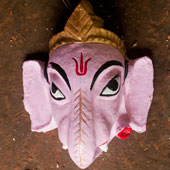Bohada is a mask festival of the tribes in the Thane and Nasik district, which is held for three days. It is celebrated every year during the month of May, any time after or between Hanuman Jayanti, Gudhi Padva or Naag Panchami. Tribal and non-tribal people from nearby places attend these three days festivals. In this festival, 52 masks of Indian Gods and Goddesses are exhibited. Mask owners wear these masks and give several performances during this celebration. Some chief mask makers, village heads and elder villagers organize this festival. The mask owners are responsible for maintaining their masks. These masks are renovated every year some days before the festival and later on preserved for next year.
The festival takes place in different villages of Thane district but the one celebrated in Bharsat Meth village is the most famous even though Mokhada village is considered to be the birthplace of the festival. The eight different villages where Bohada is organized are:
1. Mokhada bohada, Dist - Thane
2. Kardan Bohada (on Gudi Padva)
3. Bharsat meth bohada (on Akshay Tritiya)
4. Denga chi meth bohada
5. Vehel pada bohada, Taluka Vikramgadh,
6. Jawhar bohada, Dist - Thane, (on Ram navami)
7. Poyshet Bohada
8. Kokada bohada
The purpose of Bohada is to show gratitude to the Village Goddess (Gaon Devi) including all other Gods and Goddesses. As told by Madhuri Kadu, seven days before the Bohada festival tribals grow rice in a small basket. By the third day, these seedlings become 6-7 inches tall and are offered to the Gaon Devi. Bohada, which means procession, displays mask characters that depict the tribal concept of creation and their role in sustaining their life.
The 52 different masks displayed during the festival are (ref. Tribal Mask and Myths pg.27):
Naran dev, Masa, Sarjadevi/ Saraswati – peacocks, Ganpati, Mahadev, Indradev, Khanderao, Kaloba, Niloba, Bhairoba, Kalbhairi, Ram Tati, Kaurav Tati, Hedumba, Mahisasur, Bakasur, Ravan, Vishnudev, Chanddev, Suryadev, Bhim-Bakasur, Raktadevi, Ghubadevi, Agnidev, Londhya, Narsihva, Satwai, Kumbha karma – Brother of Ravan, Bhibisan - Brother of Ravan, Krishna, Charnin – a female herder, Toap – a man with cap, Balantin – new mother, Gavalani – a female herder, Garud - Eagle, Waghoba - Tiger, Sinhva – Lion, Kasav – Tortoise, Dait – a male demon, Bhil Tati, Ekadas – one headed mask, Duvadas – two headed mask, Zakati Tati, Vithoba, Rukhmai, Vetal, Gajasur, Ghoda, Evana, Dhavloba, Maha Laxmi, Shivaji Maharaj.
Some Video Link for Bohada Festival:
• Bohada Festival Dance with Mask night
http://www.youtube.com/watch?v=R3mkOfQwbQ4
• Bohada Festival Day
http://www.dailymotion.com/video/xk3ukp_tribal-culture-bohada-festival-day_lifestyle

